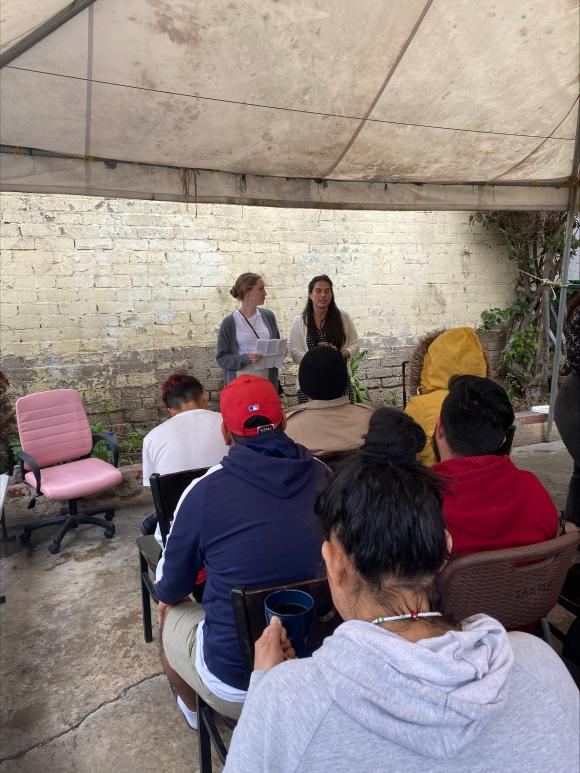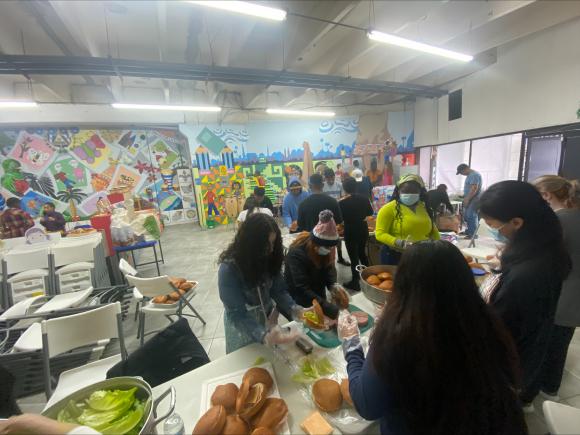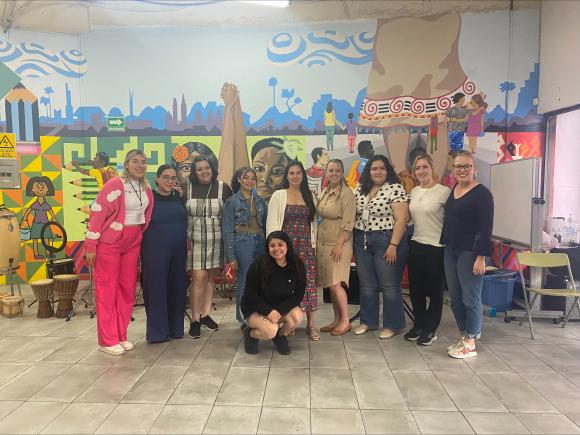
Emily Rathburn '23 and Paralegal Sylvia Santos giving a charla to migrants at the border.
In May, I was fortunate to join a passionate group of students and Immigrant Rights Clinic staff in Tijuana to assist migrants at the border. We arrived at a particularly momentous time because Title 42 had expired only days before our arrival, causing sweeping policy changes and confusion amongst those trying to navigate the system.
On our very first day in Tijuana, we saw the border wall in person. While I had read and watched sources about border conditions, it was nonetheless, jarring to see the wall firsthand. Our next day, we met the Espacio Migrante team and learned more about the important work they do, as well as connected with California-based attorneys visiting the area. We learned about the current state of the border, including reports that people were scamming migrants by selling fake CBP One appointments and that white applicants seemed more likely to be granted appointments through the app.
Each day, we visited different shelters that varied greatly in their size and demographics. One was a small LGBTQ+ shelter, where I gave a know-your-rights presentation, while others housed over a thousand migrants of diverse backgrounds. We each gave presentations at the different shelters and answered individual questions afterwards. At each shelter, there was righteous frustration and confusion because it was nearly impossible for many to make CBP One appointments without smartphones, reliable internet, or simply luck. After connecting one-on-one with many migrants, several recounted the sacrifices they made just to get to Tijuana, only for more obstacles to be thrown at them. One man described the difficulties he faced because he was kidnapped on his journey from South America and his passport was stolen, so he no longer had it as an identity document to enter the United States. He had been turned away at the U.S. border only a few days prior.

Immigrant Rights Clinic students and staff making 1,200 ham sandwiches for migrants at the border.
The team at Espacio Migrante noted that this frustration was common and people were often exploited on their journeys. They were dedicated to using the resources they had to assist where possible. Sometimes this was through legal work, but not all immigration support is legal work. One day, we joined the Espacio Migrante team and prepared 1,200 sandwiches to bring to one of the larger shelters. It wasn’t only about delivering the know-your-rights presentation or doing individual consultations, but also making sure the families there had necessary resources. Part of serving migrant communities is being there for the wide range of needs and not just one’s specialty or preference.
While most migrants spoke Spanish or Haitian-Creole, I was able to assist with a consultation in Russian. At the time, the CBP One app was only available in English, Spanish, or Haitian-Creole, which made its use even more difficult for those who speak other languages. Those who were not fluent in one of those languages faced even greater challenges and often relied on others to assist them with the process.
Overall, the experience was invaluable, and I am grateful for the opportunity I had to connect with those at the border, as well as with the team at Espacio Migrante. I am happy to have stayed in touch and assisted with some of their Russian language needs even after we left. I feel our time there was incredibly impactful, especially surrounding the expiration of Title 42. The uncertainty surrounding the change, coupled with scammers preying on migrants, made it all the more important for border communities to have access to reliable information. I am happy we were able to play a role in clarifying the nebulous process for those facing it. This experience is one I will take with me going forward and it further affirmed my drive to do immigration work in my career.
